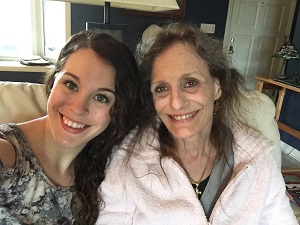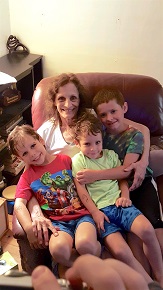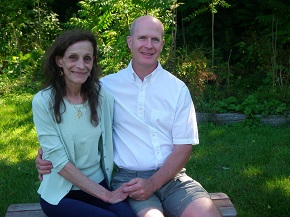Faces of COPD: Elizabeth Berger says 'We Need Medical Research Funding'
Posted on November 12, 2017 |
Elizabeth shares with us the story of her mother who was diagnosed with COPD when Elizabeth was a teenager. Living in a rural area, access is limited. Her goal is to improve access and increase research funding, so that more programs and treatment options are available and accessible to all, no matter where you live.
 “Devastating but not all that unique” is how Elizabeth describes her mom’s story of living with COPD. “She lives in a rural area in western New York with almost no access to any programs. The respiratory therapist she saw came to the area once per week and she only saw him a few times. There are some programs in Rochester but that is an hour or so away. My mom cannot drive anymore, so this is a huge challenge. She suffers from depression because of the illness and has sought treatment for that as well.”
“Devastating but not all that unique” is how Elizabeth describes her mom’s story of living with COPD. “She lives in a rural area in western New York with almost no access to any programs. The respiratory therapist she saw came to the area once per week and she only saw him a few times. There are some programs in Rochester but that is an hour or so away. My mom cannot drive anymore, so this is a huge challenge. She suffers from depression because of the illness and has sought treatment for that as well.”
Elizabeth’s mother was diagnosed with COPD when “I was very young, around 14. She was very quiet about it. I just knew she coughed a lot and sometimes had a hard time going places. At first it was barely noticeable but, as I grew older, it worsened and I began to notice more and more. After I moved away, I would visit and really notice the changes that had seemed so gradual before. I believe her COPD was mild to moderate at the time of diagnosis.”
 A stay-at-home mom, at first “my mom still tried to do everything”, however, COPD decreased her social activity “but not that much until the last 5 years. Nowadays, she can’t really go into stores and will wait in the car while my dad goes shopping. She usually goes to family members’ houses just for holidays and things. Otherwise she stays home. Sometimes she won’t even feel comfortable going very far into the backyard, depending on air quality.”
A stay-at-home mom, at first “my mom still tried to do everything”, however, COPD decreased her social activity “but not that much until the last 5 years. Nowadays, she can’t really go into stores and will wait in the car while my dad goes shopping. She usually goes to family members’ houses just for holidays and things. Otherwise she stays home. Sometimes she won’t even feel comfortable going very far into the backyard, depending on air quality.”
The family installed an air conditioner in Elizabeth’s mother’s room to “keep the humidity at bay”. Additionally, having “stations” with her most important things throughout the house has helped. “She has mostly accepted her limitations, which has helped, but it can still be hard.”
In terms of treatment, Elizabeth’s mom “didn’t have access to very much and did not see a specialist until a few years ago, at which point she was considered ‘severe’. She checks in with her primary care doctor at least once every few months.”
 As a caregiver, Elizabeth “exposed her to COPD resources and the COPD Foundation (COPDF). She participates in a support group on Facebook—the moderator does webinars on pulmonary rehab exercises—and I am happy she is able to take part in some of the webinars since she has not been able to access pulmonary rehab.”
As a caregiver, Elizabeth “exposed her to COPD resources and the COPD Foundation (COPDF). She participates in a support group on Facebook—the moderator does webinars on pulmonary rehab exercises—and I am happy she is able to take part in some of the webinars since she has not been able to access pulmonary rehab.”
Elizabeth’s mom learned to lean on family members more instead of “feeling bad” for needing help. “She still remains pretty isolated but I am happy she participates in the support group now. She is not near any research studies and has not been able to work with specific providers other than the 2-3 times she saw a respiratory therapist. I wish she had access to more things, but she is in a very rural area.”
This is one of the reasons Elizabeth got involved with COPDF and became the State Captain for Maryland. “Access and funding for pulmonary rehabilitation programs is a prudent need, as rehab has been proven to help patients yet is widely unavailable, especially in rural areas. Often, when programs are available, they are not covered by insurance and can be very costly.”
“We need medical research funding dedicated to COPD,” says Elizabeth. “If more clinical trials are implemented, we’ll be able to increase the evidence base to improve awareness and increase availability of treatment options. If research can confirm the most effective treatment methods, it is more likely that insurance will begin covering some of the costs for COPD treatments such as pulmonary rehabilitation programs. This is especially critical at this time considering the most recent healthcare initiatives.”
Elizabeth is the COPD State Advocacy Captain of Maryland. Join the network of leaders taking small steps towards greater COPD awareness nationwide. The COPD State Captain program is open to anyone who wants to take any action, big or small, to inform their communities about COPD.